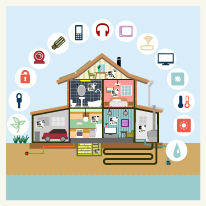Cellular carriers, such as AT&T and Verizon, have announced that they will discontinue 2G networks by 2016, focusing instead on faster 3G and 4G networks. In doing so, they can increase the data capacity of their airwave space—a necessity as smartphone usage grows.
The decision has obvious impact for consumers who own older mobile phones. For example, the first iPhone will no longer be supported. The transition also has lesser known, but just as widespread, implications for security systems.
Millions of Global System for Mobile (GSM) radios in security systems run on 2G networks. To date, 2G devices have been the industry norm when it has come to installations. Yet, as cellular carriers move toward higher speed networks, these systems will need to be updated to keep pace, or else become obsolete.
While 2016 may seem like a long way down the road, “the reality for alarm companies is that signal strength will decline for a lot of equipment in the field as these changes take hold,” according to Security System News. As a consumer, it’s best to understand your options now, and be confident your selected provider has your future interests in mind.
Ask Smart Questions
The 2G sunset will affect millions of GSM radios in security systems, regardless of provider. Whether you've had your system for years or are just looking to purchase, know if your system will be affected and next steps.
You don't want to purchase a 2G-security system that will become out-of-date in four years. You also don't want to suffer from poor planning on the provider's side, leaving you waiting for an upgrade after 2G goes black, or with unreliable connections.
Be proactive, and ask your provider:
- Will the 2G sunset impact my security system?
- When are cellular carrier changes expected to rollout in my area?
- What is your company’s timeline and plans for customer updates?
- How many of your company’s customers will be affected?
- Can I update my system in advance, or do I need to wait for a tiered rollout?
- Will I be charged a service fee to upgrade my system? If so, how much?
- Do I need to purchase new equipment, or will it be provided free of charge?
(Note: 3G/4G hardware is more expensive, so some providers may decide to up their prices to cover the additional costs.)
Keep in mind that network changes are in the hands of cellular providers, not your security partner. Radios moving forward will have a finite life based on technology advancements and carrier network capacity. That said, a solid security provider will have a plan in place, and be able to explain if and how you'll be affected. They'll be looking at the situation proactively and coming up with solutions, instead of idling waiting on the sidelines until it's too late.
We're here to help. What concerns do you have with the transition? Contact a trusted representative.
Image Source: NeilsPhotography



